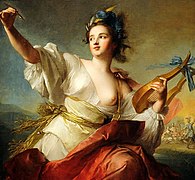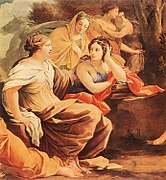
Muses
In ancient Greek religion and mythology, the Muses (Ancient Greek: Μοῦσαι, romanized: Moûsai, Greek: Μούσες, romanized: Múses) are the inspirational goddesses of literature, science, and the arts. They were considered the source of the knowledge embodied in the poetry, lyric songs, and myths that were related orally for centuries in ancient Greek culture.
"Muse" redirects here. For other uses, see Muse (disambiguation). For human muses, see Muse (person) and Category:Muses.
The number and names of the Muses differed by region, but from the Classical period the number of Muses was standardized to nine, and their names were generally given as Calliope, Clio, Polyhymnia, Euterpe, Terpsichore, Erato, Melpomene, Thalia, and Urania.[1]
In modern figurative usage, a muse is a person who serves as someone's source of artistic inspiration.









